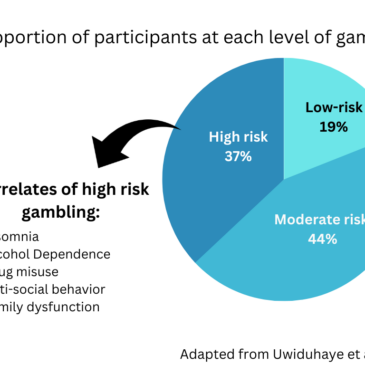With online gambling revenue projected to surpass $150 billion by 2030, developing a better understanding of the causes and consequences of gambling-related problems is especially important. A key focus in those suffering from gambling problems is the family, as family members are greatly impacted by problem gambling. However, some evidence also indicates that one’s family can potentially contribute to the risk of developing gambling problems. This week, The WAGER reviews a study by Marie Aime Uwiduhaye and colleagues that examined the role of family in the relationships among psychosocial risks, gambling problems, and other adverse outcomes.
What were the research questions?
What are the psychosocial correlates of gambling problems? Does family dysfunction moderate the relationship among gambling problems and negative outcomes, including drug misuse, alcohol dependence, anti-social behavior, and poor sleep quality?
What did the researchers do?
The researchers recruited 104 men from casinos in Musanze, Rwanda during 2019. Participants completed a number of self-report survey items, including questions about their gambling, substance use, sleep quality, family relationships, and mental health. The researchers used a combination of Pearson’s r correlation analyses and regression analyses to examine relationships. First, they examined the correlations between gambling problems and all other variables. Next, they examined these relationships through a series of regression analyses that also assessed the role of family dysfunction as a moderator.
What did they find?
Nearly half (44%) of participants reported high-risk gambling, with 37% reporting moderate risk gambling and 19% reporting low-risk gambling (see Figure). As expected, people with more severe gambling problems reported worse drug and alcohol problems (perhaps due to self-medication), as well as more insomnia, anti-social behavior, and family dysfunction. However, among participants with relatively high levels of family dysfunction, the links between problem gambling severity, and drug misuse, alcohol dependence, and insomnia (but not anti-social behavior) were stronger, suggesting that family dysfunction elevates the risk for these gambling harms.
Figure. Proportion of participants in the low-risk, moderate-risk, and high-risk gambling categories, and correlates of high-risk gambling. Click image to enlarge.
Why do these findings matter?
These findings help explain the relationship between gambling problems and frequently comorbid conditions including substance misuse. Clinicians need to understand each individual client’s pattern of co-occurring conditions, including which are primary and which are secondary, to address the root causes of distress. In addition, improving our understanding of both the causes and consequences of gambling-related problems can help enhance evidence-based treatments, which can be administered earlier in the development of problems. For example, the results of this study suggest that evidence-based treatments focused on the family, such as community reinforcement and family training, may decrease substance misuse in addition to gambling by improving family functioning.
Every study has limitations. What are the limitations in this study?
This study’s recruiting strategy was rather limited. The authors employed a convenience sample that only included men gambling at a casino. As a result, their findings might not be representative of other gamblers and the rate of high-risk gambling should not be interpreted as a prevalence estimate. Additionally, due to the cross-sectional nature of the data, we cannot be certain whether one variable causes another. Future studies should include a wider range of participants and collect data over time to better assess causality.
For more information:
Individuals who are concerned about or want to change their gambling habits can find support services through the National Council on Problem Gambling or Gamblers Anonymous. Additional resources can be found on our Addiction Resources page.
— John Slabczynski
What do you think? Please use the comment link below to provide feedback on this article.





